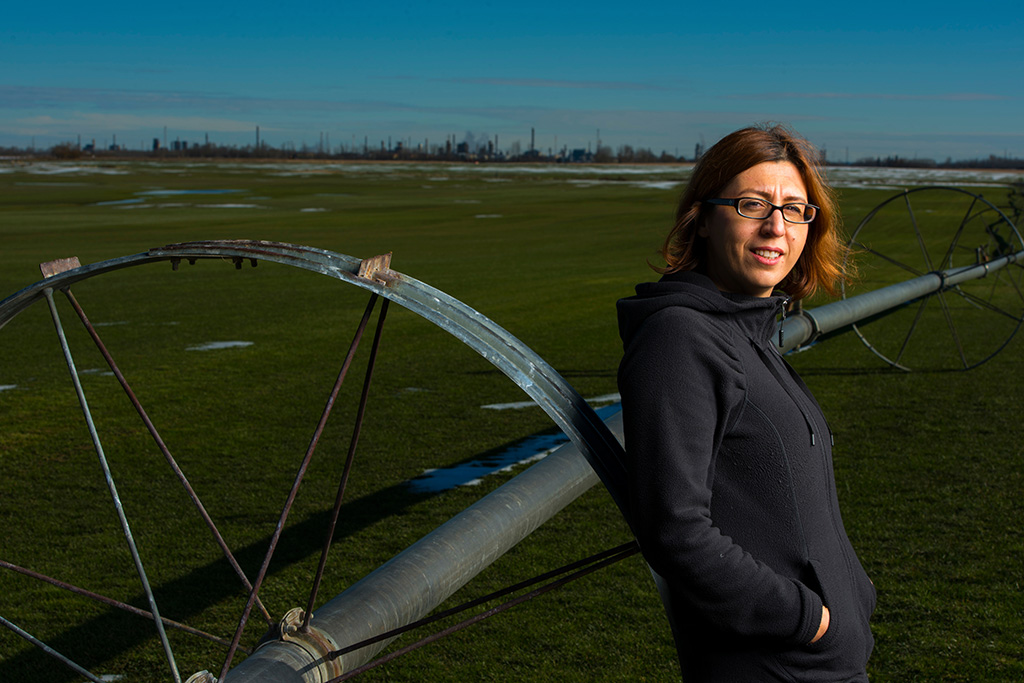
Monireh Faramarzi is the newest assistant professor with the Department of Earth and Atmospheric Sciences. Photo credit: John Ulan.
If there is one thing Monireh Faramarzi knows for sure, it's that our water and water systems are inextricably connected to everything around them, from social welfare to the economy to our society's future.
"Generally, people don't think of water as a problem in Alberta. But our economic and social systems rely heavily on water. Over half of the province's GDP depends on industry that is directly connected to water. Therefore, it is very important to study water system in a precise manner," she explains.
Faramarzi earned her PhD in hydrology and water resources management from the ETH-Swiss Federal Institute of Technology. Since then, she has collaborated with scientists and government agencies on multidisciplinary projects in Iran, Switzerland, Germany, and Canada. In 2014, she moved to Canada and began work on the Predicting Alberta's Water Future with Greg Goss, professor in the Department of Biological Sciences. Faramarzi has now joined the Faculty of Science as an assistant professor with the Department of Earth and Atmospheric Sciences.
Research vision
Faramarzi's research interest is made up of two major components-pure science and real-world application.
"In terms of the basic science, we are trying to understand the processes involved in water variability and availability all over Alberta. Alberta is a case study that encompasses many of the water security challenges faced worldwide." says Faramarzi. This includes in terms of the natural factors like glaciers, snow, vegetation, groundwater, and surface water, as well as anthropogenic factors including water management and water use of various sectors and exploration of how they are connected and what processes are involved in shaping water resources. The research group builds super-computer logical models to foster this understanding.
The other component is real-world application. Faramarzi and her colleagues collaborate with industry and stakeholders to understand how, where, and when they use water. These groups include agriculture and farming, energy and oil, hydropower, environment and wetlands, and municipalities within Alberta.
"Any major change in water can change the future of the economy and social welfare in the province," she says. "That's why it is really important to understand how water systems are balanced over time. Collaboration with external stakeholders is very important because it allows me to understand real-world questions and tailor my research projects in response."
Climate considerations
One of the largest factors affecting water and water systems today is the climate.
Water is directly affected by climate variability-including average precipitation, snowfall, and snowmelt. "We hear a lot about climate change, but we don't think about water, even though it is directly influenced by these changes," says Faramarzi.
"When temperatures are higher and we get more or less rainfall on the ground, it is very important for us to understand uncertainty associated with the effects or impacts of global warming and climate variability on water resources. Uncertainty prediction due to global warming and climate variability in water supply projections is of fundamental importance for strategic planning to adaptation and mitigation."
"Any major change in water can change the future of the economy and social welfare in the province." -Monireh Faramarzi
So, what's next?
Faramarzi's work with Predicting Alberta's Water Future aims to assess the supply and demand of Alberta's water over the next 50 years under climate variability and global warming.
"In the future, I'm really interested in looking at water quality, as well as quantity, in our province. I also hope to develop a course on water resources and water management to help encourage the next generation of researchers in this area. Water and the study of water are integral to the future of Alberta and Canada."
Faramarzi is already working with graduate students and post-doctoral fellows. She will begin teaching her first course, Hydrologic Modeling, in January 2017.